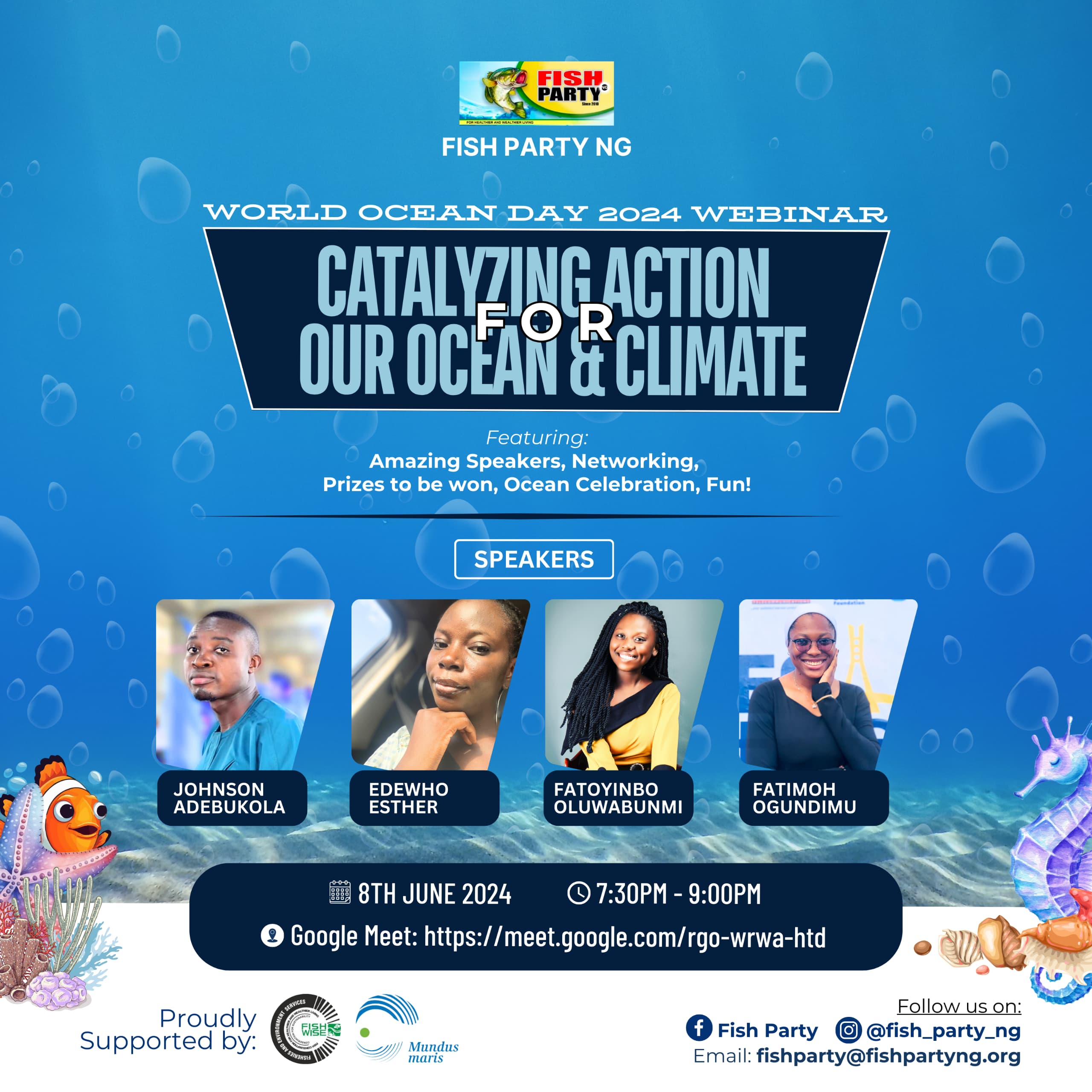World Ocean Day Virtual Seminar: Catalyzing Action for Our Ocean and Climate - Lagos calling
On June 8th, the World Ocean Day Virtual Seminar titled "Catalyzing Action for Our Ocean and Climate" was held out of Lagos, Nigeria, bringing together experts and enthusiasts to discuss pressing issues related to ocean conservation and climate change. The event was organized by Fish Party in collaboration with Mundus maris asbl and moderated by Johnson Adebukola. The seminar featured three distinguished speakers: Esther Edewho, Oluwabunmi Fatoyinbo, and Fatimoh Ogundimu, each offering unique perspectives and solutions to the challenges facing our oceans.
Mr Idowu Hunyinbo of Fish Party and Prof. Stella Williams of Mundus maris kicked off the seminar by highlighting the critical importance of oceans in regulating the global climate, supporting biodiversity, and sustaining human livelihoods. They emphasized the need for urgent action to protect these vital ecosystems from threats such as pollution, overfishing, and climate change.

The first speaker, Esther Edewho, a banker turned ocean health activist took to the floor by highlighting the detrimental effects of some negative actions on the ocean and the environment. She however, gave some intriguing strategies and ways to catalyse good actions for the environment. She mentioned simple yet effective ways for the implementation of science-based management practices, stricter enforcement of fishing regulations, and community engagement in conservation efforts. She presented case studies from some of her past experiences and that of others where sustainable practices have led to significant ecological and economic benefits.
Oluwabunmi Fatoyinbo, the second speaker who is a graduate of fisheries management spoke more on actions to mitigate against climate change and its effect on the environment. She spoke on actions to protect coastlines from erosion and support diverse marine life. Fatoyinbo stressed the importance of preserving and restoring mangrove forests, which are often threatened by development and pollution. She called for increased funding and international cooperation to support mangrove conservation initiatives.
Fatimoh Ogundimu, an environmental scientist, addressed the pervasive issue of marine pollution, particularly plastic waste. She highlighted the devastating impacts of plastic pollution on marine species and ecosystems. Ogundimu proposed a multi-faceted approach to tackling this problem, including reducing plastic production, improving waste management systems, and promoting public awareness about the consequences of plastic pollution. She also showcased successful campaigns and policies from different countries that have significantly reduced marine litter.
The presentations were followed by the presentation of the winner by Prof Stella Williams, Esther Edewho won the first prize and she was presented with the cash and kind gifts already prepared. Congratulations! Other speakers as well as all in attendance were encouraged to start taking positive actions starting with their selves and from their immediate environment to impart care for the ocean and the environment.
In his closing remarks, Dr Ayojesutomi Abiodun-Solanke thanked the speakers and participants for their contributions to the seminar. She reiterated the importance of continued collaboration and action to safeguard our ocean for future generations. She also emphasized the role of education and advocacy in driving change, urging attendees to spread the knowledge gained from the seminar within their communities. She also mentioned other activities lined up subsequently and called on more volunteers to join for these actions.
In attendance were over 50 people during the meeting which lasted for 90 minutes.
The World Ocean Day Virtual Seminar successfully brought attention to the critical issues facing our ocean and highlighted actionable solutions. The event underscored the interconnectedness of ocean health and climate stability, and the need for collective effort in catalyzing positive change. By fostering dialogue and sharing knowledge, the seminar contributed to the global movement for ocean and climate action.
Summary by Dr. Ayojesutomi Abiodun-Solanke








